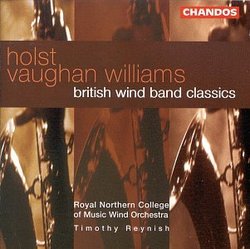| All Artists: Gustav Holst, Ralph Vaughan Williams, Timothy Reynish, Royal Northern College of Music Wind Orchestra Title: British Wind Band Classics Members Wishing: 0 Total Copies: 0 Label: Chandos Release Date: 2/9/1999 Genres: Jazz, Special Interest, Classical Styles: Swing Jazz, Marches, Historical Periods, Modern, 20th, & 21st Century, Symphonies Number of Discs: 1 SwapaCD Credits: 1 UPCs: 095115969724, 009511596972 |
Search - Gustav Holst, Ralph Vaughan Williams, Timothy Reynish :: British Wind Band Classics
 | Gustav Holst, Ralph Vaughan Williams, Timothy Reynish British Wind Band Classics Genres: Jazz, Special Interest, Classical
|
Larger Image |
CD Details |
CD ReviewsBritish Wind Band Music Brett A. Kniess | Madison, WI | 01/03/2006 (5 out of 5 stars) "This aptly titled CD, British Wind Band Classics, presents well-known compositions by Gustav Holst and Ralph Vaughan Williams. In many cases, the conductor has tried to reconstruct the composers' original score and intent with instrument choices and the number of instrumentalists (Holst generally preferred many less performers than is typically recorded today). Holst's First Suite for Military Band, as opposed to the second, is filled with inventive and original melodies; the Second Military Suite sets many pre-existing folk tunes. In three movements, the opening Chaconne, a sort of theme and variations, has a noble theme of fifths and seconds put into various settings. The second, Intermezzo, is a minor-mode scherzo with a jumpy sounding minor theme. The final march, begins sad with brass alone, a dreamy theme is picked up by the wind section, and a glorious conclusion puts the two together, a common technique by Holst. A snappy little suite. The Second Suite for Military Band is unashamedly folk-based. The opening March with lyrical Euphonium solo middle section and a compound Scottish reel, make the opening a great concert opener. The gorgeously lyrical second movement, based on I Love My Love, is followed by the highly rhythmical Song of the Blacksmith, complete with anvil. The final movement is a fantasia on Dargason, a familiar Scottish song. Again Holst overlaps two melodies for a rousing conclusion. Many will buy this CD for the suites alone, so a few notes. Some will consider this recording of the Holst Suites merely academic or plain British stuffiness when compared to the classic Fennell recordings. While Reynish opts for slightly more spacious tempos and creates an ensemble of smaller, more intimate proportions, they work for this ensemble, and in many ways breathe new life into these works, which are usually played at too fast tempos. Many points of musicality are won on this recording, where it is lost on others. Holst's arrangement of J.S. Bach's Fugue ala Gigue works rather well for wind band, with a lilting fugal feel. Holst's Two Songs Without Words is also included on this recording: The Marching Song and the important Hammersmith. The Marching Song is infested with a sad mournful tune in march garb, followed by a lyrical, almost academic melody, but eventually gives way to the gloomy opening march, but ends with triumph. In three sections, the opening of Hammersmith has a frightening bass line that unrelentingly press on. The only piece on the disk that has extensive use of dissonance, the fearful opening gives way to a scherzo, with mocking winds and a quartal melody that skips all over. The ending portion uses the opening bass line with snatches from the rest of the work. Brooding and dissonant, a great piece. The Vaughan Williams portion of the CD includes the Toccata Marziale, here performed from the original manuscript, not the incorrect printed version. An exciting, if not perfunctory, march, Vaughan Williams' musical language for wind band is a bit more fantastical, evenly orchestrated, compared to Holst. The opening fanfare of the 2-minute Flourish for Wind Band is glorious, with a short little lyrical middle section, and ends as it begins. Vaughan Williams' famous English Folk Song Suite is more along the lines of Holst's Second Military Band Suite, with unabashed folk songs. Here presented as in the original performance, with the addition of the Sea Songs as the second movement. The first movement, Seventeen Come Sunday has a jumpy minor theme, while the second movement, Sea Songs, is more forwardly jolly, along with a charming dance-like middle section. A plaintive solo oboe opens the melancholy Intermezzo third movement, subtitled My Bonny Boy, but a sprite piccolo melody in ¾ time picks up the movement, before descending into sullenness again. The Suite ends in pure friendliness and jubilation, concluding the work and the CD in fine form. Highly musical interpretations of English wind band classics, makes this CD a good addition to any library. The classic Fennell is definitely hard to beat, but this is a different sound, more spacious tempos (the slower moderatos make the faster sections more exciting), and a pared-down ensemble, more musical qualities shine through in these works that I hadn't heard in other recordings. Compare with other recordings; it holds its own." Great Collection! D. Fargione | New York | 01/06/2005 (5 out of 5 stars) "I have played all three movements of Holst's First Suite in E Flat for Military Band in concert and this cd really captures all the magic the song has when played live! On of my favorite band recordings thus far!" Reliving past glory... Stephen R. Stetler | Grand Rapids, MI, USA | 08/02/2005 (5 out of 5 stars) "What a great collection! I've played most of this music in the past and was delighted to find it together in this compilation."
|

 Track Listings (16) - Disc #1
Track Listings (16) - Disc #1